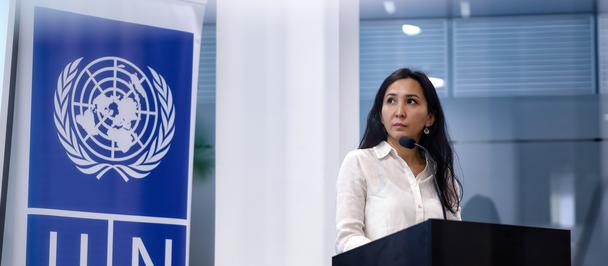Over 100 Rural Residents Attend Agritourism Workshops with UNDP Support
December 2, 2022

2 December 2022, Astana - More than 100 farmers acquired agritourism skills after taking part in mobile training workshops organized by the Kazakhstan Association of Agri and Rural Tourism (KAART), with United Nations Development Programme (UNDP) support.
The workshops, which took place in East Kazakhstan, Kostanai, North Kazakhstan and the Akmola regions, sought to boost the region's tourism potential and provide farmers with additional income in the face of climate change.
Environmental change, increased climate variability and an increase in the frequency of extreme weather events are reducing agricultural productivity and putting pressure on agribusiness. Small-scale producers are particularly vulnerable to the effects of climate change. For example, as a UNDP study shows, the loss of wheat yields due to climate change in Kazakhstan will reach 20-49 percent by 2050 and the reduction in livestock pastures – by 15.2 percent.
According to Sukhrob Khojimatov Deputy Resident Representative of the UNDP in Kazakhstan:
"Transitioning to sustainable agriculture can strengthen the joint benefits of climate change adaptation and mitigation measures. Agrotourism development, in particular, allows tourist flows to be targeted at villages and rural areas, as well as the teaching of new skills to rural residents to create a favourable environment for new business development and job creation. This, in turn, helps to reduce rural residents' vulnerability to climate change”.
In addition, an information tour for media representatives, bloggers and tour operators was organized to the Akylbai and Katarkol villages, Burakol district, Akmola region, to introduce the results of farmers’ training to the general public. Participants on the tour went to a cheese factory, a trout farm, a guest house and an agro-complex.
According to Khalida Tulegenova, President of KAART:
“Agrotourism is an opportunity to discover the full potential of rural areas by visiting natural and historical landmarks, observing traditions and everyday life, enjoying gastronomy and admiring the craftsmanship and creative flair of rural artisans. In the near future, these tours are expected to become popular among an increasing number of urban residents. Our task is help rural residents to organize and develop a successful approach to the skills taught, one that will provide an additional source of income and promote rural development”.

 Locations
Locations



